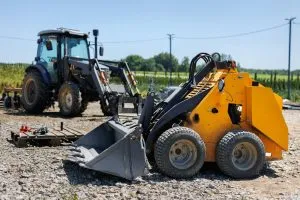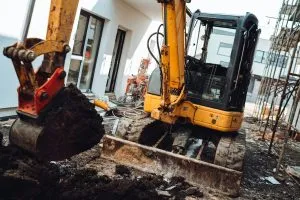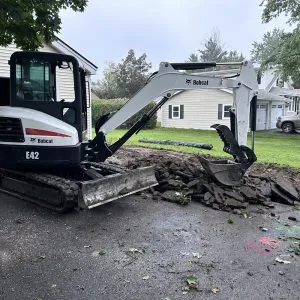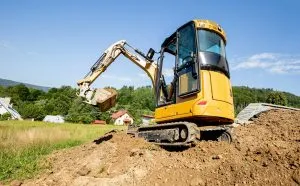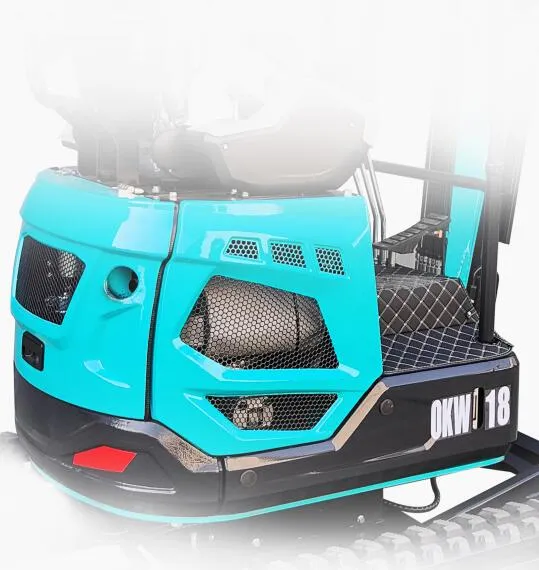How to Buy a Mini Excavator from China: A Comprehensive Guide
In today’s global marketplace, purchasing heavy machinery like mini excavators from China has become an increasingly popular option due to the competitive pricing, vast selection, and improving quality of Chinese products. However, navigating the process of importing machinery can be complex, requiring careful planning, research, and execution. This guide will walk you through everything you need to know about buying a mini excavator from China, ensuring a smooth and successful transaction.
1. Introduction to Buying a Mini Excavator from China
Buying a mini excavator from China can be an advantageous endeavor for construction businesses, contractors, and even individuals seeking cost-effective solutions for their heavy machinery needs. China’s manufacturing sector has expanded rapidly, producing machinery that rivals Western brands in quality but at a fraction of the cost. However, this process involves more than just selecting a product and placing an order; it requires a strategic approach to ensure you get the best deal and avoid potential pitfalls.
In this guide, we will explore each step of the process, from understanding your requirements to selecting a reliable supplier, negotiating terms, and ensuring quality control. By the end, you’ll be equipped with the knowledge to make an informed purchase, minimizing risks and maximizing value.

2. Why Buy a Mini Excavator from China?
China has established itself as a global leader in manufacturing, and the mini excavator market is no exception. The benefits of buying from China include:
- Cost Efficiency: Chinese mini excavators are often priced significantly lower than their Western counterparts, offering substantial savings.
- Wide Range of Options: The Chinese market offers a vast selection of mini excavators, from basic models to advanced versions with cutting-edge technology.
- Improved Quality: Over the years, Chinese manufacturers have made considerable strides in improving the quality of their machinery, making them a viable alternative to Western brands.
- Customizable Features: Many Chinese suppliers offer customization options, allowing buyers to specify particular features that cater to their unique needs.
That said, buying from China also requires careful consideration of factors such as supplier reliability, product quality, and after-sales support, which we will cover in this guide.

3. Understanding Your Requirements
Before diving into the market, it’s essential to have a clear understanding of what you need in a mini excavator. This involves identifying the types of excavators available, the key specifications to consider, and how these align with your project requirements.
3.1 Mini Excavator Types
Mini excavators come in various types, each suited for different applications. The main categories include:
- Conventional Tail Swing Excavators: These are traditional mini excavators with a standard rear overhang. They are generally more stable and have a larger digging depth.
- Zero Tail Swing Excavators: These machines have no rear overhang, allowing them to work in confined spaces without the risk of hitting obstacles with the tail.
- Compact Radius Excavators: These offer a middle ground, with reduced tail swing compared to conventional models but not as compact as zero tail swing types.
3.2 Key Specifications to Consider
When selecting a mini excavator, consider the following specifications:
- Operating Weight: This indicates the machine’s stability and lifting capacity. Common ranges for mini excavators are between 1 to 10 tons.
- Engine Power: The engine’s horsepower determines the machine’s overall performance. Higher power is required for more demanding tasks.
- Digging Depth: This specification is critical for projects that require deep trenching or excavation.
- Bucket Capacity: This affects how much material can be moved in a single pass, impacting overall efficiency.
- Hydraulic System: A reliable hydraulic system is vital for the smooth operation of the excavator’s arms and attachments.
- Tracks: Mini excavators can have rubber or steel tracks, each suited for different terrains and applications.
3.3 Assessing Your Needs
Your choice of mini excavator should align with the specific demands of your projects. For instance, if you are working in urban environments with limited space, a zero tail swing model might be ideal. Alternatively, for heavy-duty tasks in rugged terrain, a more powerful model with a robust hydraulic system and steel tracks might be necessary.
Consider not only your immediate needs but also future projects to ensure you select a machine that offers versatility and longevity.
4. Researching Chinese Suppliers
Once you’ve defined your requirements, the next step is to find a reliable supplier in China. The success of your purchase heavily depends on the credibility and quality of the supplier you choose.
4.1 Where to Find Reliable Suppliers
There are several avenues to find reputable suppliers:
- Online Marketplaces: Websites like Alibaba, Made-in-China, and Global Sources list thousands of suppliers, allowing you to compare products, prices, and reviews.
- Industry Trade Shows: Attending trade shows like the Canton Fair or Bauma China can provide direct access to manufacturers, allowing you to inspect products and negotiate deals in person.
- Sourcing Agents: Hiring a local sourcing agent can help you navigate the Chinese market, identify reliable suppliers, and manage the procurement process.
4.2 Evaluating Supplier Credentials
Once you’ve identified potential suppliers, it’s crucial to evaluate their credentials:
- Business License and Certifications: Ensure the supplier has a valid business license and any necessary certifications for manufacturing construction machinery.
- Reputation and Reviews: Check online reviews and ask for references to gauge the supplier’s reputation in the market.
- Product Quality: Request product samples or visit the supplier’s factory to inspect the quality of their mini excavators.
- Experience and Expertise: Prefer suppliers with extensive experience in the industry and a strong track record of exporting to your region.
4.3 The Importance of Factory Visits
If possible, visit the factory to verify the supplier’s capabilities firsthand. A factory visit allows you to:
- Inspect the manufacturing process and quality control measures.
- Discuss customization options directly with the engineers.
- Assess the overall professionalism and reliability of the supplier.
While not always feasible, especially for smaller purchases, a factory visit can significantly reduce the risks associated with buying machinery from abroad.

5. Negotiating with Chinese Suppliers
Negotiation is a crucial part of the buying process, where you can secure better terms, pricing, and additional services.
5.1 Establishing Communication
Effective communication is key to successful negotiation. Here are some tips:
- Be Clear and Concise: Clearly state your requirements, budget, and expectations.
- Use Professional Language: Maintain professionalism in your communications, even if language barriers exist.
- Leverage Technology: Use video calls to build rapport and discuss details more effectively than through emails alone.
5.2 Tips for Successful Negotiation
To negotiate effectively:
- Research Market Prices: Understand the general pricing trends for mini excavators in China to identify a fair price range.
- Ask for Discounts: Volume discounts or promotional offers may be available, especially if you are purchasing multiple units.
- Negotiate Payment Terms: Aim for favorable payment terms such as partial payments upfront and the balance upon delivery.
- Discuss After-Sales Support: Ensure that the supplier offers sufficient after-sales support, including parts availability and service options.
5.3 Understanding Pricing Structures
Pricing for mini excavators can vary widely based on several factors:
- Model and Specifications: More advanced models with additional features will naturally cost more.
- Order Volume: Larger orders often attract better pricing per unit.
- Shipping Costs: Consider whether the price includes shipping, and if so, what type of shipping is used.
- Customs Duties: Be aware that the quoted price may not include customs duties or taxes that you’ll need to pay upon import.
Understanding these components will help you negotiate a deal that reflects the total cost of ownership, not just the purchase price.

6. Quality Control and Inspection
Ensuring the quality of the mini excavator before it leaves China is critical to avoid costly surprises later.
6.1 Importance of Pre-shipment Inspections
A pre-shipment inspection is an essential step in verifying that the product meets your expectations and the agreed specifications. This process typically includes:
- Visual Inspection: Checking for defects or damage in the machinery.
- Operational Testing: Ensuring that the excavator operates smoothly and meets performance standards.
- Verification of Specifications: Confirming that the product matches the order details, including any customization.
6.2 Engaging Third-Party Inspection Services
To ensure an unbiased evaluation, consider hiring a third-party inspection service. These services provide a detailed report on the condition and compliance of the mini excavator, offering peace of mind before you make the final payment.
6.3 Ensuring Compliance with International Standards
When buying a mini excavator from China, ensure it complies with international standards such as CE (Conformité Européenne) or ISO (International Organization for Standardization) certifications. Compliance with these standards ensures the machinery meets safety and quality benchmarks recognized globally.
7. Shipping and Logistics
Once the purchase is confirmed, the next step is arranging for the shipment of your mini excavator. This involves selecting the right shipping method, managing customs clearance, and understanding the costs involved.
7.1 Choosing the Right Shipping Method
The shipping method you choose will depend on factors such as cost, delivery time, and the destination. Common options include:
- Sea Freight: The most cost-effective method for large and heavy machinery, though it takes longer (typically 4-8 weeks).
- Air Freight: Faster but significantly more expensive, usually only viable for urgent deliveries or smaller items.
- Land Freight: If you’re in a neighboring country, land freight might be an option, offering a balance between cost and speed.
7.2 Customs Clearance and Documentation
Proper documentation is crucial for smooth customs clearance. Ensure that you have all the necessary paperwork, including:
- Bill of Lading: A detailed list of the shipped goods.
- Commercial Invoice: Includes the value and terms of sale.
- Packing List: Specifies the contents and packaging details.
- Certificate of Origin: Confirms the country where the product was manufactured.
- Import License: Some countries require an import license for heavy machinery.
Working with a customs broker can simplify this process, ensuring that all regulations are met and avoiding delays.
7.3 Cost Considerations and Insurance
Shipping costs can add significantly to the overall price of your mini excavator. Consider the following:
- Freight Costs: The cost of transporting the excavator to your location.
- Customs Duties and Taxes: Import duties, VAT, and other taxes that may apply.
- Insurance: Shipping insurance protects your investment in case of damage or loss during transit. It’s advisable to opt for comprehensive coverage.
Factoring in these costs will help you accurately calculate the total cost of acquiring your mini excavator.

8. Payment and Financial Security
Making payments to a foreign supplier involves risks, so it’s crucial to use secure methods and take precautions to protect your financial interests.
8.1 Secure Payment Methods
Common payment methods include:
- Letter of Credit (L/C): Offers security for both buyer and seller by ensuring payment upon receipt of the goods, as confirmed by the bank.
- Telegraphic Transfer (T/T): A bank transfer directly to the supplier. Often used for smaller transactions, but it carries more risk since the payment is made upfront.
- Escrow Services: Payment is held by a third party and released only when both buyer and seller confirm that the transaction terms have been met.
8.2 Managing Currency Exchange Risks
Fluctuations in currency exchange rates can affect the total cost of your purchase. To manage this risk:
- Lock in Rates: Use forward contracts or lock in exchange rates with your bank to protect against unfavorable shifts.
- Pay in Local Currency: If possible, arrange to pay in your home currency to avoid exchange rate fluctuations.
8.3 Avoiding Payment Scams
Unfortunately, scams are a concern when dealing with international transactions. To protect yourself:
- Verify Supplier Credentials: Double-check the supplier’s legitimacy through independent research or third-party verification services.
- Use Trusted Platforms: If using online marketplaces, ensure they have secure payment systems and buyer protection policies.
- Be Wary of Unusual Requests: Avoid suppliers who ask for payment via non-traditional methods or to accounts in different names or countries.
Taking these precautions will help ensure that your financial transactions are secure and that you receive the machinery as expected.
<a name=”legal-regulations”></a>
9. Legal and Regulatory Considerations
When importing a mini excavator from China, you must comply with both Chinese export regulations and your own country’s import laws.
9.1 Import Regulations in Your Country
Before purchasing, familiarize yourself with the import regulations specific to construction machinery in your country, such as:
- Import Licenses: Determine if you need an import license to bring heavy machinery into your country.
- Safety and Emissions Standards: Ensure the mini excavator meets your country’s safety and environmental standards, which may differ from those in China.
- Restricted Items: Some countries have restrictions on certain types of machinery or parts. Verify that your purchase is permissible.
9.2 Tariffs, Duties, and Taxes
Importing machinery typically incurs tariffs, duties, and taxes that can significantly impact the final cost. These may include:
- Customs Duties: A percentage of the item’s value, often varying based on the type of machinery and its origin.
- Value-Added Tax (VAT): Many countries impose a VAT on imported goods.
- Excise Taxes: Additional taxes on specific goods, such as those related to environmental impact.
Consult with a customs broker or tax advisor to understand the full cost implications of importing a mini excavator.
9.3 Intellectual Property Considerations
While rare, there is a risk of purchasing machinery that infringes on intellectual property rights, which can lead to legal issues. To avoid this:
- Work with Reputable Suppliers: Established suppliers are less likely to deal in counterfeit or infringing products.
- Verify Product Legitimacy: Ensure the mini excavator is a legitimate model and not a knockoff of another brand.
- Check Patent and Trademark Status: Confirm that the machinery does not violate any patents or trademarks in your country.
Being aware of these legal considerations can help you avoid costly legal disputes and ensure a smooth import process.

10. After-Sales Support and Warranty
After-sales support is crucial when purchasing machinery from abroad, ensuring you have access to necessary services and parts after the sale.
10.1 Understanding Warranty Terms
Carefully review the warranty terms offered by the supplier:
- Warranty Period: The length of time the machinery is covered.
- Scope of Coverage: What parts and services are included under the warranty.
- Conditions for Claims: Any conditions that must be met to make a warranty claim, such as regular maintenance or specific use guidelines.
10.2 Accessing Spare Parts and Service
One of the key challenges when importing machinery is the availability of spare parts and service. Consider:
- Local Availability: Check if spare parts are available locally or if you will need to order them from China.
- Service Centers: Determine whether there are authorized service centers in your region that can handle repairs and maintenance.
- Technical Support: Ensure the supplier offers technical support, ideally with a local presence or through online channels.
Reliable after-sales support will ensure your mini excavator remains operational and productive, minimizing downtime and repair costs.
10.3 Dealing with Product Defects
In the event of defects or malfunctions, it’s essential to know how to address these issues:
- Document Issues: Take photos or videos of the defect and report it to the supplier immediately.
- Follow Warranty Procedures: Adhere to the supplier’s process for warranty claims to avoid invalidating your coverage.
- Consider Local Repair Options: For minor issues, it may be faster and more cost-effective to use local repair services rather than shipping the machine back to China.
Handling these issues promptly and effectively will ensure that you can resolve any problems with minimal disruption to your operations.

11. Case Study: Successful Purchase of a Mini Excavator from China
To illustrate the process, let’s look at a case study of a successful mini excavator purchase from China.
Background: A small construction company in the United States needed a mini excavator for residential projects. They wanted a machine that was both cost-effective and versatile enough for various tasks.
Research: The company identified their requirements—a 3-ton zero tail swing model with a digging depth of at least 10 feet. They researched online and found several potential suppliers on Alibaba.
Supplier Selection: After evaluating the credentials and reviews of multiple suppliers, they narrowed it down to one with a good track record, a valid business license, and positive feedback from previous buyers.
Negotiation: The company negotiated the price, securing a discount for ordering additional attachments. They also agreed on payment terms: 30% upfront and the remaining 70% upon confirmation of shipment.
Inspection and Shipping: A third-party inspection service was hired to check the mini excavator before shipment. The machine passed the inspection, and the company arranged for sea freight shipping.
Customs Clearance and Delivery: The mini excavator cleared customs without issues, thanks to the detailed documentation provided by the supplier. The total delivery time was 6 weeks.
After-Sales Support: The company received the machine in good condition and was provided with a 12-month warranty. Spare parts were available through the supplier’s partner in the U.S., ensuring easy maintenance.
Outcome: The mini excavator met the company’s expectations in terms of performance and cost savings, allowing them to take on more projects and increase their profitability.
This case study highlights the importance of careful planning, supplier selection, and quality control in ensuring a successful purchase.

12. Pros and Cons of Buying from China
Buying a mini excavator from China offers several advantages, but it also comes with potential drawbacks. Here’s a balanced view:
Pros:
- Cost Savings: Chinese mini excavators are often more affordable than Western brands, offering significant cost savings.
- Wide Range of Options: The Chinese market provides a vast selection of models and features to choose from.
- Customization: Many Chinese suppliers offer customization options, allowing you to tailor the machine to your specific needs.
- Improving Quality: The quality of Chinese machinery has improved significantly, making them a viable alternative to established Western brands.
Cons:
- Risk of Low Quality: Despite improvements, there is still a risk of encountering low-quality products, especially from less reputable suppliers.
- Communication Barriers: Language differences and time zones can make communication challenging.
- Shipping and Import Costs: While the initial purchase price may be lower, shipping, customs duties, and taxes can add up.
- After-Sales Support: Access to spare parts and service may be more difficult, especially if there is no local presence.
Weighing these pros and cons will help you decide if buying from China is the right choice for your needs.
13. Conclusion: Making an Informed Decision
Purchasing a mini excavator from China can be a cost-effective solution for your construction needs, provided you approach the process with careful planning and due diligence. By understanding your requirements, selecting reliable suppliers, negotiating favorable terms, and ensuring quality control, you can secure a high-quality machine that meets your needs without breaking the bank.
Brands like Nicosail are known for their commitment to quality and customer satisfaction, making them a good option to consider. While it’s important to do your research and compare different suppliers, opting for a reputable brand like Nicosail can offer added peace of mind in terms of product quality and after-sales support.
Ultimately, the key to a successful purchase lies in thorough research, clear communication, and attention to detail at every step of the process. By following the guidelines outlined in this guide, you can navigate the complexities of buying a mini excavator from China and make an informed decision that benefits your business.

14. Frequently Asked Questions
Q1: How long does it typically take to ship a mini excavator from China? Shipping times vary based on the shipping method and destination. Sea freight typically takes 4-8 weeks, while air freight can be much faster, usually 1-2 weeks.
Q2: What are the risks of buying a mini excavator from China? Risks include potential quality issues, communication barriers, and difficulties in after-sales support. Working with reputable suppliers and using third-party inspections can mitigate these risks.
Q3: How can I ensure the mini excavator meets safety standards? Ensure the machine complies with international certifications like CE or ISO. A third-party inspection can also verify that the excavator meets safety and performance standards.
Q4: What payment methods are safest when buying from China? Letters of Credit (L/C) and escrow services are among the safest methods, as they protect both the buyer and the seller. Telegraphic Transfers (T/T) are common but carry more risk.
Q5: Can I customize a mini excavator when buying from China? Yes, many Chinese suppliers offer customization options, allowing you to specify features like engine power, bucket size, and additional attachments.
Q6: Is it possible to return the mini excavator if it doesn’t meet my expectations? Return policies vary by supplier. It’s crucial to discuss return options before purchase and ensure that terms are clearly stated in the contract. Pre-shipment inspections can help avoid the need for returns.


